#now that i think about it - Rodrigo and Elisabetta have like what. ONE scene together in the opera
Text
Sometimes I read the confrontation scene between the Queen and Posa in Schiller's Don Carlos.
And afterwards I am always very much not ok and I regret it immensely. Just. Wow. Get fucked, Schiller, why are you doing this to me? Why am I doing this to myself?
#don carlos#don karlos#whichever you prefer#this is NOT about the opera for once#god#GOOOOD#friedrich schiller#how could you man#i mean uhh#i love Rodrigo what is new#but i also adore Elisabeth in this play. she's gorgeous. iconic really.#the way she calls him out on his bullshit at the end of this scene????? PREACH GIRL#but also. do you know what doesn't help? the fact that i genuinely believe she had a huge crush on him#it's like. obvious. look at the way she interacts with Carlos. and then how she talks to and about Rodrigo#she's all like '😍😍 the Marquis of Posa?!?! oh yeah i like him a normal amount what a nice guy right he's so cool hahaha yeah Carlos whom?'#poor girl#but yeah this scene makes me. scream.#and i will neeeeveeeer forgive Verdi that he didn't put it in his opera#now that i think about it - Rodrigo and Elisabetta have like what. ONE scene together in the opera?#and she still doesn't really speak to him. im not counting the quartetto because they do not interact there#but in the play??? they have like three or four scenes together? i love their relationship in the play so much.#i just love that basically everyone is in love with someone who's not in love with them#and that all this could have been avoided if only carlos and rodrigo werent such idiots and lerma didnt try too hard to be nice and helpful#and if philip wasnt such a mess. and if eboli wasnt such a bitch. and if alba and domingo werent such douchebags.#ok... so maybe it couldn't be that easily avoided. but anyway. love this scene. it always makes me cry and just. ughh#honestly if you're still here and you haven't read Schiller's Don Carlos yet - what are you doing here?! go! go break your own heart in two!
15 notes
·
View notes
Photo
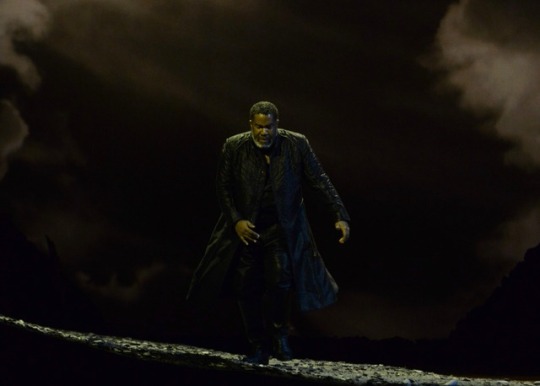
OPERA / 2017-2018
DON CARLO
OPEN REHEARSAL
Washington National Opera
Music by Giuseppe Verdi
Libretto by Joseph Méry and Camille Du Locle
Translated into Italian by Achille de Lauzières and Angelo Zanardini
Based on Friedrich von Schiller’s dramatic work Don Carlos
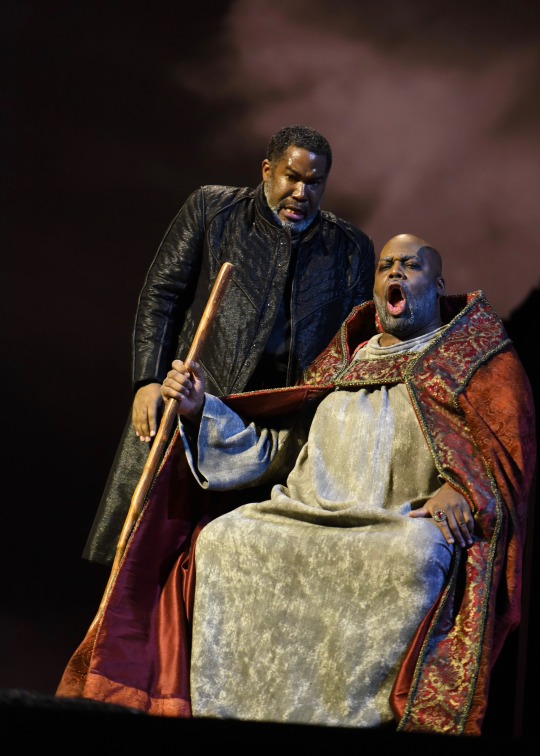
So, What’s Going On?
Spain, the mid-sixteenth century.
Our hero, Don Carlo isn’t doing well. The infante (een-FAHN-teh, basically a Spanish word for “prince”) can’t get along with his father, King Filippo II (fee-LEEP-poh), and, to top it off, Carlo has no real royal responsibilities to keep him busy.
Oh, and did we mention he’s in love with his stepmother?
Filippo had promised Carlo a beautiful French bride named Elisabetta (eh-leez-ah-BEHT-tah), but, at the last minute, the king swept in and married her himself. Not cool. Nope, definitely not cool.
Enter Rodrigo (ro-DREE-goh), a nobleman and Carlo’s best friend. Rodrigo tries to cheer Carlo up by getting him involved in a political cause (nothing says “distraction” like a revolution). Spanish-occupied Flanders, (present-day Belgium) Rodrigo explains, is badly oppressed and needs a leader ASAP. Having a lot of free time on his hands, Carlo agrees to act as “savior” to the Flemish (i.e., the folks from Flanders). Got it so far?
But there’s a catch. He’ll need his stepmom’s permission.
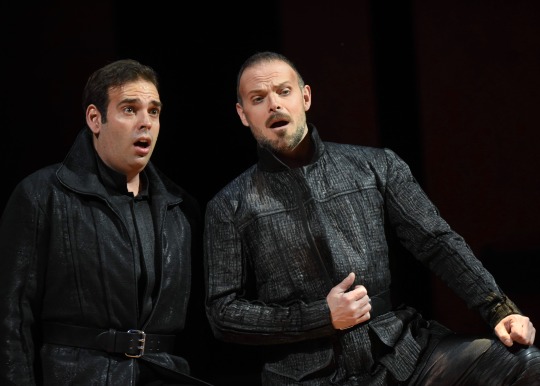
Rodrigo fires Carlo up for a Flemish fight.
Take a listen…
In one of opera’s most famous duets, Rodrigo and Don Carlo take a vow of friendship and promise to work together to achieve freedom for Flanders. Listen for the sounds of the brass instruments, symbolizing war and aggression, as well as royalty.
youtube
Back to the story…
Rodrigo arranges a meeting between Carlo and Elisabetta, telling the queen her heartbroken stepson needs a favor. But one of the queen’s ladies-in-waiting, the Princess of Eboli (EHB-oh-lee), overhears and takes Carlo’s heartbreak completely out of context—she thinks Carlo might be in love with her.

At the meeting set up by Rodrigo, Carlo tells Elisabetta he’s dying of love.
In other palace news, the king is highly suspicious of Elisabetta’s relationship with Carlo. He summons Rodrigo and asks him to spy on Carlo and Elisabetta’s extracurricular activities. Rodrigo unwisely uses this moment to plead for Flanders, claiming the king is applying unnecessary force to maintain peace in the Flemish territories. Though slightly moved, Filippo warns Rodrigo his rebellious ways may get him into trouble with the Spanish Inquisition (…bet you weren’t expecting that).
Sometime later, Carlo receives a mysterious letter. Thinking Elisabetta wishes to see him, he waits for her in a romantic spot, and she promptly arrives wearing a veil for cover.
(Yeah, just kidding: It’s not really Elisabetta, but Eboli in disguise.)
Carlo whispers sweet nothings to “Elisabetta,” but when the mix-up comes to light, he tries to take back his professions of love. The damage is done, however—Eboli figures out Carlo’s words were meant for someone else…and that the “someone else” must be the queen.
Rodrigo rushes in. Believing Eboli will go straight to the king for revenge, he asks Carlo to hand over any incriminating evidence pertaining to Flanders.
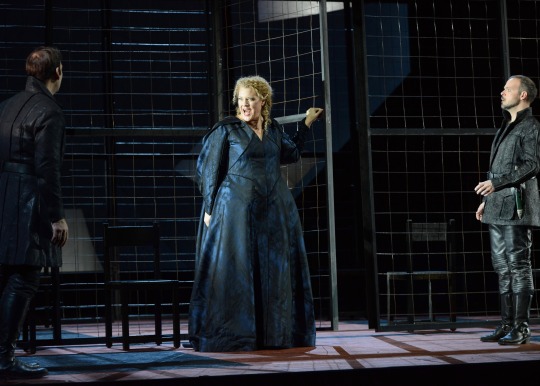
Eboli plots vengeance against Carlo for (accidentally) playing with her heart.
But tensions between Filippo and Carlo are about to boil over anyway. At an auto-da-fé (an execution led by the Inquisition and overseen by the king), Carlo interrupts the ceremony by bringing some Flemish citizens before Filippo to call the king out and beg for royal mercy. Things get heated, and Carlo draws his sword. Horrified by this treasonous act, Filippo calls for someone to arrest his son. To everyone’s surprise, Rodrigo steps forward and leads Carlo to jail.
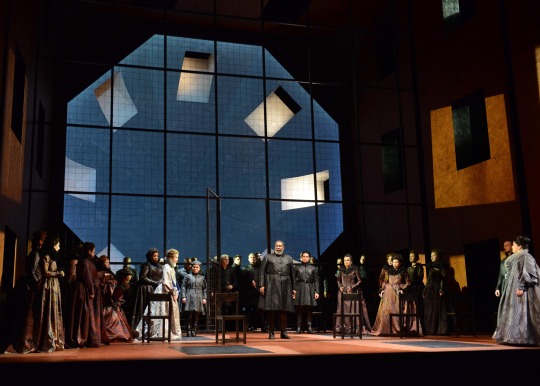
A private family feud is put on public display.
Take a listen…
In his aria, “Ella giammai m’amò” (“She never loved me”), Filippo contemplates the sad state of his marriage. Listen for the sorrowful string music, which repeats incessantly as if to reflect Filippo’s relentless thoughts.
youtube
Filippo wants Carlo out of the way (like…completely out of the way), so the king appeals to the Grand Inquisitor to ask if the holy man will pardon Filippo for ordering Carlo’s execution. Convinced the uprising of the Protestant-leaning Flemish—and not Carlo—is the real threat to Spain and to the Catholic Church, the Inquisitor slyly suggests Filippo may be absolved if he hands over the traitorous Rodrigo in exchange. Yikes.
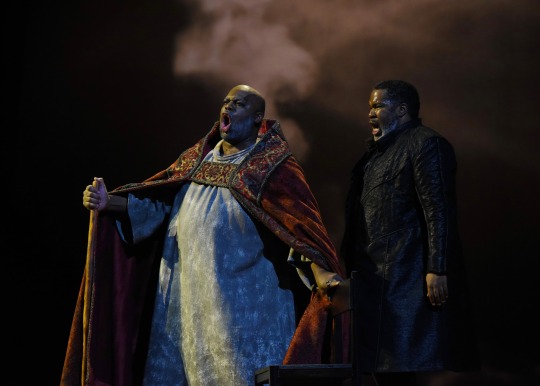
The Grand Inquisitor offers a terrible bargain: Religious blessing in exchange for Rodrigo’s demise.
Take a listen…
In this intentionally frightening scene, the Grand Inquisitor’s deep and forceful voice, along with the quivering strings and percussion, remind the audience (and Filippo) that the church wields power in sixteenth-century Spain.
youtube
Suddenly, Elisabetta bursts in claiming she’s been robbed. She asks her husband to take action against the culprit, but Filippo quickly admits to the crime himself. He then confronts Elisabetta about a portrait of Carlo she keeps hidden in her stolen jewelry box. Elisabetta maintains her innocence, however. She may love Carlo, but she’s never been unfaithful.
And yet here’s a twist: Filippo has.
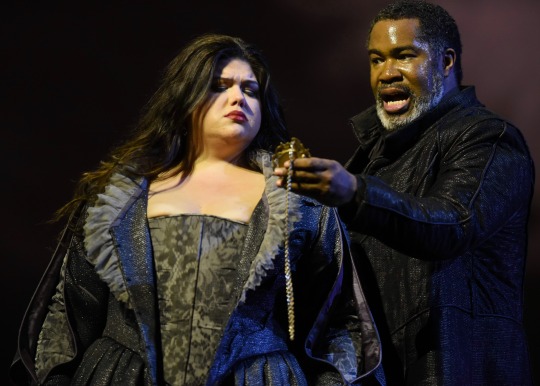
Filippo tries to shame Elisabetta.
While comforting the queen after Filippo’s accusation, Eboli confesses she’s been having an affair with the king and that jealousy (for both Carlo and Filippo) led her to steal Elisabetta’s box and throw some serious shade at the queen. Shocked, Elisabetta orders Eboli to head to a convent. Eboli searches for a way to make things right—and finds one. She stumbles onto Carlo’s death warrant and resolves to intervene before it’s too late.
Take a listen…
Eboli curses her own vanity for inspiring her to betray her queen in the aria “O don fatale” (“Oh fatal gift”). Check out how the mezzo-soprano uses both high and low notes to convey her sense of frustration and despair in the musical sample below. Also: Listen for the outbursts from the trumpets, trombones, and horns at the opening. Can you tell things have gotten pretty serious?
youtube
But can Eboli alert Carlo in time? Can Rodrigo escape the watchful eye of the Inquisition? And, most importantly, will Elisabetta and Carlo be allowed to ride off into the Spanish sunset?
Who’s Who
(Italian version of the original Spanish names listed; English version names in parentheses)
Don Carlo (Don Carlos) infante of Spain (tenor—the highest male voice)
Filippo (King Philip II) Carlo’s father and king of Spain (bass—the lowest male voice)
Elisabetta (Elizabeth of Valois) queen of Spain (soprano—the highest female voice)
The Princess of Eboli (known as “Eboli”) (mezzo-soprano—a middle-range female voice)
Rodrigo marquis of Posa and Carlo’s friend (baritone—a middle-range male voice)
The Grand Inquisitor (bass)
Good to Know
You’ve heard of the Spanish Inquisition before, right? No?
Okay, well, just in case you haven’t, you might want to keep in mind that the Spanish Inquisition was a Catholic branch of the Spanish government whose task was to find and “question” anyone who wasn’t loyal to the Catholic church, particularly Jews and Protestants. These “interviews” were often literal torture, as the Spanish monarchy was known to use the Inquisition as an excuse to enslave innocents in order to get free labor.
Now that you’re familiar with the Inquisition: Did you know King Philip II, his wife Elizabeth, his son Carlos, and the Princess of Eboli were also real? Philip II was a sixteenth-century Spanish monarch who did indeed marry a French woman (Elizabeth of Valois) whom he had initially intended for his son. Turns out Philip and Elizabeth actually had a reportedly happy marriage, and the love story between Elizabeth and her stepson was invented by writer Friedrich von Schiller in the eighteenth century and exploited by Verdi in the nineteenth century for maximum dramatic impact.
The Princess of Eboli was likewise a genuine attendant at court and the wife of King Philip’s right-hand man. Rodrigo, however, never actually existed; he’s more of an ideal representation of compassion and progressive thinking created by Schiller at a time when the Enlightenment ideals of reason and rationality swept across Europe.
And Carlos? Sadly the historical Carlos wasn’t quite the romantic hero he is in the opera. Rowdy, and unpredictable, the real-life Carlos was decidedly not in love with his stepmom. Yet, as in the opera, Carlos wasn’t given much power by his father and eventually grew fed up with life in Spain. The infante then demanded control over Flanders, which was being ruled by a brutal cardinal of the Catholic Inquisition.
Just like in the opera, Flanders was a place of political (and religious) unrest in the mid-sixteenth century. Absorbed into Spain’s considerable empire via a political marriage, Flanders was somewhat content to be ruled by Philip’s father, Charles V, who had been born in Flanders and was well respected there. Things changed when Philip assumed the throne, however: Philip was more Catholic than his father and the new king had no trouble sending clerical and military forces to keep the Protestant-friendly Flemish in line—often using violent methods of persuasion.
Philip ultimately deemed his son unfit to serve as ambassador to such an unstable region and had Carlos put in jail to prevent a political catastrophe (thanks, dad). Carlos died while under arrest, but the Flemish controversy continued, and uprisings followed soon after.
Check This Out…
Don Carlo features many melodies that repeat themselves to help the audience recall a particular scene or emotion from earlier in the story. Listen up for tunes that come back to haunt these characters again and again (especially the themes from Carlo and Rodrigo’s Act I duet, Carlo’s first lovesick solo, and the choir of horns that opens the opera).
Though Carlo is the title character, all the leading roles in the opera are given at least one aria (solo song) in which to express their feelings, and each character has their own unique musical and vocal style. Can you identify some of the ways in which Verdi gives each character his or her own spin? Is there a type of note (high, low, stretched out, cut short, etc.) or rhythm (slow, fast, galloping, etc.) that sticks out as being a specific character’s “signature sound”?
The finale of Don Carlo is notoriously open-ended, leaving much of the interpretation up to the performers and production team. Pay close attention during those final moments. What do you think the director and designers of this particular version wanted the audience to believe about the characters’ fates? Do you feel this explanation of the ending is correct? What do you think actually went down in the Spanish court?
Verdi wanted to immerse his audience in the culture and atmosphere of his operas. One of the ways he achieved this effect in Don Carlo was to include music that plays just off stage, giving the illusion of “surround sound” and extending the action of Don Carlo beyond the borders of the proscenium. Listen for the organ, church bells, brass band, choirs, and solo soprano voice coming from the wings of the theater. Do these help you feel like you’re at the heart of the story?
Think About This…
The dialogue between Filippo and the Grand Inquisitor—which was purposely added to the original story by Verdi and his librettists—includes some heavy musical clues regarding the evil subtext of the scene. In fact, Verdi uses ominous-sounding instruments to make it abundantly clear that some devilish plots are being hatched. What instruments stick out for you in this moment? What do you think Verdi’s position was regarding organized religion? What do you think he felt about monarchies like the one in Spain?
Eboli sings a song about a woman who hides her appearance and discovers a terrible secret. And…surprise! Later in the opera, the princess herself actually wears a veil and uncovers something about Don Carlo she wishes she hadn’t. Do you think the creators were making a specific point about disguises or about women who mask their identity?
Don Carlo is a mixture of big, crowded scenes for huge choruses and smaller, more intimate moments for four people or fewer. This contrast between public life and personal drama is something that continues to fascinate audiences in the twenty-first century. Can you name some recent films or TV shows in which the private struggles of a handful of characters are set against the backdrop of an overarching story that packs an epic and/or historical punch (hint: think The Crown or Game of Thrones minus the dragons)? Do they parallel Don Carlo in some way? Why do you think viewers are still drawn to these types of dramas?
Filippo, though tyrannical and misguided, is ultimately portrayed as a sad and lonely figure in the opera—thanks in large part to Verdi’s sympathetic music and also to the made-up love triangle between Filippo, his son, and his wife. Do you think Filippo’s desperate attempts to govern the lives of his family and his subjects are a response to his own feelings of helplessness? How do you think the other characters handle forces beyond their control (e.g., love, war, religious duty, honor, etc.)? Do you think anyone in the opera is more successful than Filippo at facing down these seemingly insurmountable challenges?
Take Action
As hinted above, the private actions in Don Carlo often have public consequences. Toward the end of the opera, Rodrigo, whose personal loyalties to the king and to Carlo are severely tested, ultimately chooses a path he feels will do the most good for the most people. In his beautiful final aria, he considers the type of legacy he wants to leave behind and asks that Carlo never forget him and never abandon the Flemish people. “Non ti scordar’” (“Do not forget”), he sings.
Take some time to think about how your own personal actions can affect public discourse or change. Research a group of people facing adversity like those in the Flemish territories mentioned in the opera (this could be a group you consider yourself a part of and/or strongly identify with, or it could also be a community you simply wish to help). Next, come up with a plan to spread the word and jumpstart a campaign to make a positive difference. Concerned for the people devastated by recent hurricanes, fires, and other natural disasters? Organize an afterschool meeting to educate your fellow students and to brainstorm fundraising ideas. Want to throw your support behind victims of abuse in a foreign nation? Set up a crowdsourced relief fund and ask family and friends to donate.
Want a wider audience for your social justice campaign? Use social media platforms like Twitter, Facebook, Instagram, Snapchat, or tumblr to get people talking about your cause and to post news and pictures of outreach events. If you decide to post, let us know by using the hashtag #donotforget.
Explore More
Go even deeper with the Don Carlo Extras.
–
Major support for WNO is provided by Jacqueline Badger Mars.
David M. Rubenstein is the Presenting Underwriter of WNO.
WNO acknowledges the longstanding generosity of Life Chairman Mrs. Eugene B. Casey.
WNO's Presenting Sponsor

Don Carlo is a production of the Clarice Smith Opera Series.
Additional support for Don Carlo is provided by The Dallas Morse Coors Foundation for the Performing Arts.
The Domingo-Cafritz Young Artist Program is made possible through the generous support of The Morris and Gwendolyn Cafritz Foundation, with additional funding provided by Judy and Billy Cox, Robert and Lynn Downing, Carl M. Freeman Foundation, Virginia McGehee Friend, Susan Carmel Lehrman, John & Mary Lee Malcolm, Michael F. and Noémi K. Neidorff and The Centene Charitable Foundation, Mr. and Mrs. Geoffrey P. Pohanka, Dr. Arthur and Mrs. Robin Sagoskin, Mr. Alan J. Savada and Mr. Will Stevenson, Dr. and Mrs. Guillermo Schultz, Mr. and Mrs. Michael R. Sonnenreich, Washington National Opera Council, and The Women’s Committee of Washington National Opera.
This performance is made possible by the Kimsey Endowment; The Morris and Gwendolyn Cafritz Foundation and the U.S. Department of Education.
Major support for educational programs at the Kennedy Center is provided by David M. Rubenstein through the Rubenstein Arts Access Program.
Kennedy Center education and related artistic programming is made possible through the generosity of the National Committee for the Performing Arts and the President's Advisory Committee on the Arts.
1 note
·
View note
Text
Top 5 opera lyrics
tagged by @revedebeatrice - thank you! this is a good one! It's all in Italian, sorry. Gotta restrain myself from making it all Don Carlo quotes. Having said this (in no particular order):
Carlo del Re, suo genitore, rinchiuso il cor ognor trovò, eppur non so chi dell'amore saria più degno, ah, inver nol so. // Rodrigo from Verdi's Don Carlo.
There's something about this quote that has always touched and moved something deep inside my heart. It's just - isn't this one of the most beautiful things you could say about another person? That you do not know who on earth could be worthier of love than them? It's amazing. And the context he says it in - this is the only moment Rodrigo and Elisabetta get when they're speaking directly to each other. The opera doesn't have their big confrontation scene from the play, and yet this little part does remind me of that scene a little bit. The way Posa loves Carlo so much, that he just. accepts that he is not the one Carlo really wants to be loved by, and his heart may break, but he will do what he can to ensure that Carlo be loved anyway - because in his eyes, Carlo is the person that is The Worthiest of being loved, like jesus fuck, man, this bitch gay and in love and I'm sorry, I'm probably not being coherent at all but this bit is one of the most beautiful quotes ever and I am so sad that this part is usually cut from the aria.
Perché mai, se in pianto e in pene per me tutto si cangiò, la memoria di quel bene dal mio sen non trapassò? // la Contessa from Mozart's Le nozze di Figaro.
This moment is so wonderfully bittersweet. Bittersweet is something Mozart does better than any other composer - Mozart will rarely give you a sad, minor-key aria (like eg. Pamina's - which is also beautiful btw). No, Mozart will give you a nice, major-key melody, that will still break your heart into a hundreds pieces BECAUSE of its sweetness, of its tranquil melancholy (another great example of that - Sesto's tanto affanno soffre un core ne si muore di dolor). There is no real sadness without joy preceding it, no sense of loss without first having something you cherished and loved. And that quote, the character of the Countess, is a testament to that - chapeau bas, Da Ponte (and Boucher, i guess), chapeau bas. This entire situation wouldn't hurt her half as badly, if she didn't still remember the times when her husband loved her, when she was his entire world, when they were happy together - maybe she would be happier now if she were able to forget all that. Idk, this character, and this moment in particular, always kinda reminded me of my mom, so maybe that's why it speaks to me on a personal level.
Vivan le femmine, viva il buon vino - sostegno e gloria d'umanità! // Don Giovanni from Mozart's Don Giovanni (duh).
This is simply my life motto ok. Also, this is the moment in the opera when Don Giovanni really seals his fate, imo. The statue comes in to punish him, but Elvira comes to save him. And he rejects her (but also, yay, women and wine - same, Giovanni).
-O Leporello mio, va tutto bene! -O Don Giovannino mio, va tutto male! //from Mozart's Don Giovanni.
Just. Mood. I love all their recitatives so much, but this one is truly iconic lol Da Ponte was a genius.
-Posso il figlio immolar al mondo, io, cristian? -Per riscattarci Iddio il suo sacrificò. (...) -La natura, l'amor, tacer potranno in me? -Tutto tacer dovrà per esaltar la fé. //Filippo II and il Grande Inquisitor from Verdi's Don Carlo
The entire duet is amazing (the entire opera!!!!! but i cant put the entire opera here). But this part - I don't think any comment is needed. This is what religion does when the authority is given to the right (wrong) people. This whole duet is just a terrifying display of all that.
----
Tagging @solraneth @lessthansix @tornaloadir @carlodivarga-s @babinicz <33
Honourable Mentions(tm) under the cut, because I have lots of feelings but don't want to bother you all even more, I'm nice like that <33
Honourable mentions:
Paghiam, o femmine, d'ugual moneta questa malefica razza indiscreta. Amiam per comodo, per vanità! - Despina is a feminist icon, we stan. Girl really said 'go out, be a slut, #kill all men'. No, honestly, I love Despina.
Ogni donna cangiar di colore, ogni donna mi fa palpitar! - yeah, Cherubino just gets it <3 Women are amazing.
Gran Dio! Morir sì giovane... - this entire outburst of Violetta's from La Traviata. I could talk about Violetta for hours, because La Traviata is in no way a boring love story, I'd say it is not even really a love story at all. And I love how righteously furious she gets here and how she just shouts all this in God's face - she feels betrayed, and lied to, and deceived, she was promised a reward for this noble sacrifice and instead she gets the worst punishment possible - to die when a happy ending is just at an arm's reach. Just how cruel is that?
and we're back to Don Carlo, sorry not sorry. Literally everything Carlo and Rodrigo say to each other; from Tu soffri - già per me l'universo dispar! and Vien, presso a me il tuo cor più forte avrai! to Del mio cor sei la speranza. Questo cor che sì t'amo a te chiudere non so, in te riposi ogni fidanza. Io m'abbandono a te. / etc. like jesus, boys, get a room.
Restate. just.... Restate. I have many feeling about Restate.
Il cor ha un sol desir - la pace dell'avel. Yeah.
Ah, di me non ti scordar! - this is just. I don't know, but this one thing hits me especially hard in this heartbreaking scene. Let's talk about Rodrigo's martyr complex. Can we talk about Rodrigo's martyr complex? Please, I'm dying to talk about Rodrigo's martyr complex all day! Yeah, he sacrifices himself for Carlo but... Is it really all that selfless? Is it? *slides a physical copy of Schiller's play (opened on the last page of Posa's big scene with Elisabeth) in your direction across the table* Is it??????
The goddamn Lacrimosa.
ughhh there's so many other quotes i like but shut upppp ok it's way too long as it is, nobody cares, bye, that's it. Thanks for coming to my TED talk.
16 notes
·
View notes